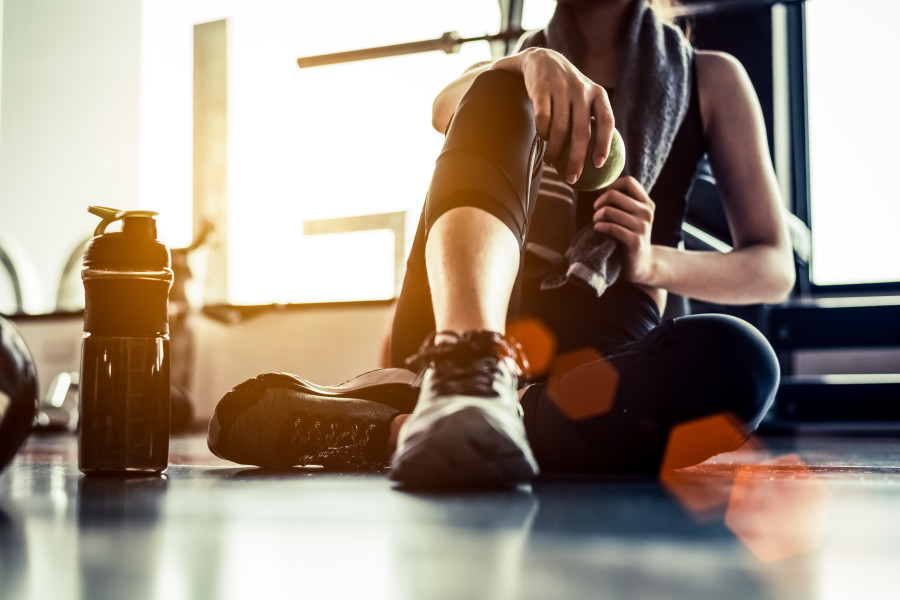Life & Style
Debunking fitness myths
Powerlifter and fitness trainer Suraj Rana shares common misconceptions about fitness he encounters while training clients.
Aarati Ray
With the rise of social media and influencer culture, the fitness world is rife with misinformation and myths. While some influencers offer sound advice, many might exaggerate fitness routines for more watch time.
Powerlifter and fitness trainer Suraj Rana shares some common misconceptions and myths about fitness he has encountered while training clients. Rana is also a biotechnologist, head coach at Tapout Fitness Nepal and a powerlifting regional judge at Nepali Youth Fitness & Calisthenics.

More sweat equals more calories burned
Sweating a lot doesn’t necessarily mean you’re torching more calories. Sweating during a workout is mainly our body’s way of staying cool, not a direct measure of how many calories we burn. Factors like the weather, how much you naturally sweat and staying hydrated play a role in how much you sweat.
Feeling extra sweaty when dehydrated might trick you into thinking you are burning more, but that’s not the case.
Nowadays, there are better ways to figure out how many calories we’re burning during a workout, like keeping an eye on our heart rate or using fitness gadgets. So, don’t stress too much about the sweat—it’s not the only sign of a good workout.
No pain, no gain
The saying “No pain, no gain” makes it seem like you have to feel pain during workouts for them to be effective. The saying is more about cerebral pain or making sacrifices related to healthy eating habits and a healthy lifestyle.
But somehow, people have started using it for physical pain. Pushing yourself too hard and feeling pain during a workout can lead to injuries. It also means that you are not doing the exercise right.
It’s better to know the difference between feeling uncomfortable, which is normal when working hard and actual pain, which is a sign that you might be hurting yourself.
Pushing too hard without a break can make you feel tired and might lead to more injuries. So, keep it sensible, don’t aim for unnecessary pain and take the time your body needs to bounce back.
Longer workouts are always better
Believing that longer workouts are inherently better can be misleading. Spending excessive time exercising may lead to overtraining, resulting in fatigue, decreased performance and heightened injury risk. The focus on duration overlooks the importance of exercise quality.
Instead, you should prioritise the quality of your workouts. Short, intense workouts can yield significant benefits, sometimes surpassing longer sessions. High-intensity interval training (HIIT), involves brief, vigorous exercise intervals alternated with rest periods. This approach maximises efficiency and effectiveness, proving that workout duration isn’t the sole determinant of strength.
Women should avoid strength training and bulking up
Many believe that women should steer clear of strength training to avoid becoming overly muscular, but this is a misconception. In reality, strength training offers numerous benefits for women, such as strengthening bones and enhancing overall fitness.
Contrary to popular belief, lifting weights won’t necessarily lead to bulky muscles. Instead, it helps sculpt toned and defined muscles. Women can tailor their workouts to suit their preferences without concerns about excessive muscle growth.
One size fits all
This is a common misconception I often encounter among my clients. Many come to me with aspirations of resembling a particular influencer, actor, or bodybuilder they admire. However, achieving such a physique isn’t as straightforward as it seems. What we see in images may not reflect the full story; behind-the-scenes dedication and hard work are often overlooked.
We are unique, with varying body types, preferences and health considerations. Fitness should be personalised to suit an individual’s needs and desires. A successful fitness plan adapts to your evolving requirements over time.
Acknowledging our differences and crafting a tailored plan that aligns with your goals is key to achieving optimal fitness results.
Supplements are a must for fitness
Not everyone needs fitness supplements. Eating various healthy foods usually gives your body the necessary vitamins and minerals. While athletes or those with specific health issues might benefit from supplements, getting nutrients from natural foods is better for most people.
Unfortunately, many people turn to unsupervised supplements influenced by social media, which can pose serious health risks. It’s essential to consider factors such as your health, fitness objectives, diet and lifestyle before deciding whether supplements are appropriate for you.
Taking supplements without guidance can lead to health complications, especially if you are already on medication for an existing condition. It is advisable to seek advice from healthcare professionals or nutritionists regarding supplement usage. Prioritising natural foods over supplements can contribute to a well-rounded and healthy diet.




 9.6°C Kathmandu
9.6°C Kathmandu










